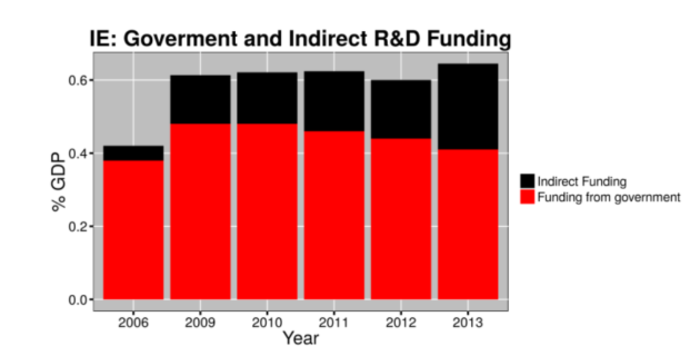Foreign companies dominate their Irish rivals when it comes to researching new products
Two-thirds of all expenditure on R&D in Ireland comes from multinational firms.
RESEARCH AND DEVELOPMENT work in Ireland is dominated by multinationals, which dwarf indigenous businesses when it comes to innovation.
According to a report from the European Commission, foreign-owned firms account for two-thirds of Ireland’s spend on R&D, with only 400 companies making up a large share of the total expenditure.
The report added that there are “limited spillovers” from that research to native Irish small and medium businesses.
“The evidence also points to the fact that most R&D expenditure in Irish-owned firms, 72%, is being carried out in sectors that are not significant exporters,” it said.
Below target
The study noted that Irish R&D intensity – that is, how much companies spend on R&D as a percentage of their overall sales – was around 1.5% during 2014, below the European target of 2%.
It also pointed to another report carried out by the Irish government and published last November which noted that there remained “a high proportion of Irish-owned enterprises across the economy that do not undertake any R&D activities”.
Even in cases where indigenous enterprises were “engaged”, the levels of investment in innovation remained low.
It added that Ireland’s R&D expenditure in the public sector as a percentage of GDP was also below the EU average and OECD median in 2012.

“While Ireland has maintained public spending on research at 2010 nominal levels, this constitutes a decrease in real terms,” the report said.
The European Commission report follows a call from the OECD earlier this year for Ireland to shift its approach from tax breaks that favoured multinationals to direct support for innovative SMEs.
Measures for change
The study did note that the Irish government has introduced some measures to try and address the issue, such as an R&D tax credit and a range of funding schemes provided by state bodies such as Enterprise Ireland and Science Foundation Ireland.
It also said that, thanks to a “sustained investment” in R&D over the past 10 years, “Ireland has been able to join the top 20 countries for scientific output and scores remarkably well in a number of innovation output indicators”.
However, it said that Ireland should focus its efforts on “maximising the impact of public research funding” and getting the highest possible return from the Horizon 2020 programme, an EU-wide initiative that provides funding for R&D.
The report also called for the consolidation of the roles of several agencies which handle grants for R&D.
“Companies can struggle to understand the funding structures in place for research and innovation across the various government bodies from Enterprise Ireland, Science Foundation Ireland, IDA Ireland, etc,” it said.
“The large number of support schemes to businesses research and innovation should be rationalised.”






